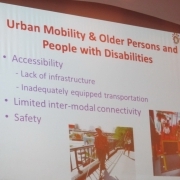The 28th World Habitat Day was held on October 7, 2013 in Bangkok.
 Since 1986, the first Monday of October has been globally designated for a reflection on the state of our cities and to remind ourselves of the basic right to adequate shelter.
Since 1986, the first Monday of October has been globally designated for a reflection on the state of our cities and to remind ourselves of the basic right to adequate shelter.
And for the first time in history, the majority of the world population is living in urban areas. In Asia-Pacific, urbanization is proceeding at unprecedented speed and scale. Rapid urbanization presents opportunities and challenges to the countries in the region. Urban populations have been expanding faster than the ability of cities to accommodate them. Increasing demand has placed social and environmental services, energy, land, shelter, and transport supplies under enormous strain.
This year, the World Habitat Day was dedicated to urban mobility, which plays an important role in the pursuit of sustainable and inclusive cities. As noted in the Global Report on Human Settlements 2013, the purpose of ‘transportation’ and ‘mobility’ is to gain access to destinations, activities, services and goods. Access is the ultimate goal and the focus should be how to bring people and places together. Access to affordable transport is a determinant factor in the livelihoods of the urban poor, directly influencing their range of housing and employment options. There is an intense debate around ways to meet the demand in an economically, socially and environmentally sustainable manner. Suboptimal transportation systems create and exacerbate issues that are not, and cannot, be resolved simply through new transit infrastructure development.
To commemorate World Habitat Day 2013, we brought together key stakeholders in urban development and the transport sector in Thailand and Asia-Pacific for interlinked events at the United Nations Conference Center last Monday, 7 October:
UN Messages on World Habitat Day and High-level Address
As is tradition, senior representatives of ESCAP and UN Habitat read out the WHD messages of the Secretary General and the Executive Director of UN Habitat. This year, the Minister of Social Development and Human Security from Thailand gave its address.
Panel Discussion
The panel discussion reflected on accessibility and the need to look at the mobility issue beyond simply increasing the length of urban transport infrastructure. Mobility needs vary among different social groups in the city, which is why the panel discussion aims to bring out the views of urban poor communities, women, youth, disabled persons, and other stakeholder groups. Panelists include representatives from government, civil society and academia.
Launches of UN Publications
UN HABITAT Office Bangkok took the opportunity of WHD commemorations to launch the ‘Global Report on Human Settlements 2013: Planning and Design for Sustainable Urban Mobility’ in Bangkok.
UNDP Asia Pacific Regional Centre and UN-HABITAT Office Bangkok will launch a new joint ‘Asia Pacific Issue Brief Series on Urbanization and Climate Change’, which brings forward some of the critical challenges faced in urban centers throughout the region.
Receiving WHD marchers
Traditionally, the UN in Bangkok receives one or several groups of marchers (from different urban poor networks) outside the gates of the UN compound to receive a petition or declaration from them. This year, WHD was being co-organized by UN Habitat, ESCAP and UNDP. Most activities took place at the UNCC and simultaneous Thai-English interpretation was made available.